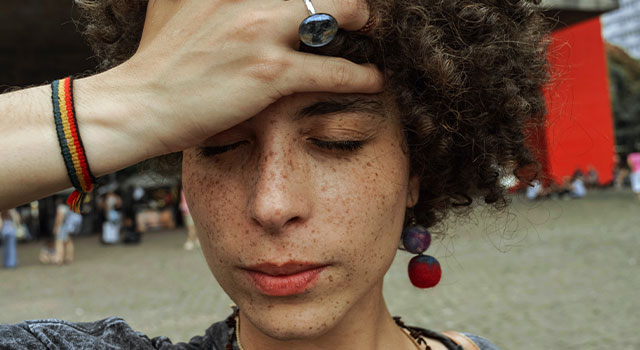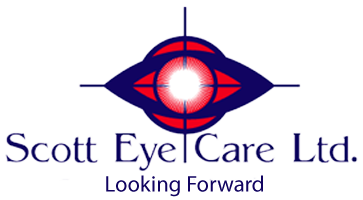 Headaches are a common symptom of several different health conditions, and almost everyone has experienced them at one time or another. In fact, up to 75% of American adults aged 18-65 suffer from headaches every year.
Headaches are a common symptom of several different health conditions, and almost everyone has experienced them at one time or another. In fact, up to 75% of American adults aged 18-65 suffer from headaches every year.
But many don’t realize that chronic or occasional headaches can actually signal a problem with their visual system.
This is especially true for individuals with binocular vision issues such as convergence insufficiency or focusing, which are frequent challenges faced by people who have experienced a traumatic brain injury (TBI), a stroke, or other neurological insults. Fortunately, those who suffer from visual dysfunction can find relief from their headaches by doing a personalized program of neuro-optometric vision therapy.
How Can Vision Problems Cause Headaches?
More real estate in the human brain is dedicated to the sense of vision than any other sense we have. In other words, seeing clearly and comfortably takes serious brain power.
When the visual system is damaged, either from a TBI or other condition, it struggles to function properly and compensates by working overtime. This straining process often results in a headache.
The most common form of visual dysfunction that can result in headaches is binocular vision dysfunction (BVD), a condition in which the eyes are misaligned and therefore don’t point in the same direction. Convergence insufficiency and accommodative dysfunction are other common forms of binocular vision dysfunction that can cause headaches.
Symptoms of Vision-Related Headaches
The only way to tell for certain if your headaches are caused by visual dysfunction is by having your neuro-optometrist perform a functional visual evaluation.
However, the following symptoms are common in patients with visual dysfunction:
- Frontal headache in the brow area
- Sensitivity to light
- Headache pain that impedes daily functioning or memory
- Dizziness
- Dull, stabbing or throbbing pain around the eyes
- Double or blurry vision
In contrast, people suffering from tension headaches usually feel like their forehead is being squeezed by a tight band.
If you or a loved one experiences any of the symptoms of visual dysfunction, know that relief is available. Schedule a consultation with your neuro-optometrist at the first sign of vision-related headaches.
Our Neuro-Optometrist Can Treat Your Vision-Related Headaches
When headaches are rooted in visual dysfunction, healing the visual system often alleviates the accompanying symptoms.
At Developmental Vision Center, we help patients who’ve sustained varying degrees of brain injury to rehabilitate their visual system and regain lost visual functioning.
Following a thorough assessment, we will determine if any visual deficit is causing or contributing to your headaches and recommend the next steps to take.
Neuro-optometric rehabilitation therapy is a tailor-made treatment consisting of in-office sessions or specialized prism glasses to help train the eyes and brain to work in unison. It is often prescribed to patients with BVD and other vision problems to correct eye alignment and promote more efficient visual processing. By doing so, some weight is taken off of the visual system and your headaches will likely become less severe or even cease.
If you or a loved one are experiencing headaches, call Developmental Vision Center in Oswego to schedule a functional visual evaluation and find the relief you seek.
Developmental Vision Center offers neuro-optometric rehabilitation therapy to patients from Oswego, Naperville, Aurora, and Chicago, Illinois and surrounding communities.
Q: How common is visual dysfunction after a traumatic brain injury?
- A: According to the Neuro-Optometric Rehabilitation Association, visual symptoms are found in about 90% of patients who’ve sustained a traumatic brain injury. The most common of these visual symptoms include sensitivity to light, blurred vision, headaches after visual tasks, difficulty reading, difficulty with eye movements and vision loss.
Q: Can neuro-optometric rehabilitation therapy also treat migraines?
- A: Yes. Visual dysfunction may also produce symptoms of migraines, and treating the problem will help alleviate the pain. Contact your neuro-optometrist if you suffer from migraines to learn if the problem is visual.
References
- https://www.optometrists.org/general-practice-optometry/guide-to-eye-conditions/guide-to-blurry-vision-and-headaches/visual-migraines/headaches-and-migraines/
- https://www.brainline.org/article/post-traumatic-headache-after-tbi
- https://noravisionrehab.org/patients-caregivers/about-brain-injuries-vision/common-vision-problems-symptoms-following-a-brain-injury

*Saturday hours bi-monthly, please check with office to confirm we are open.